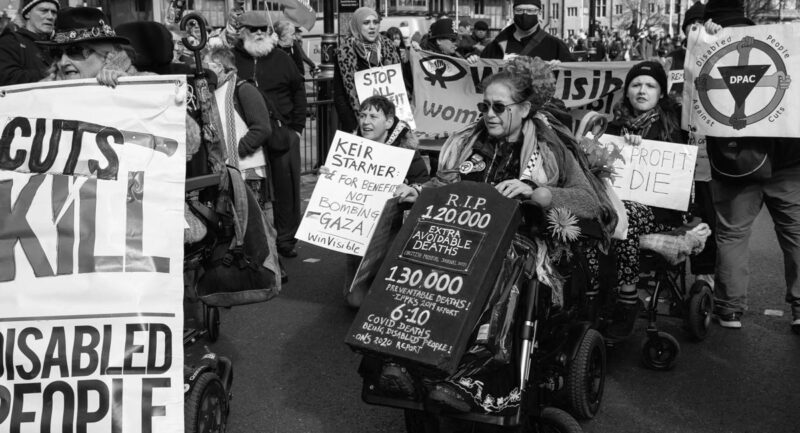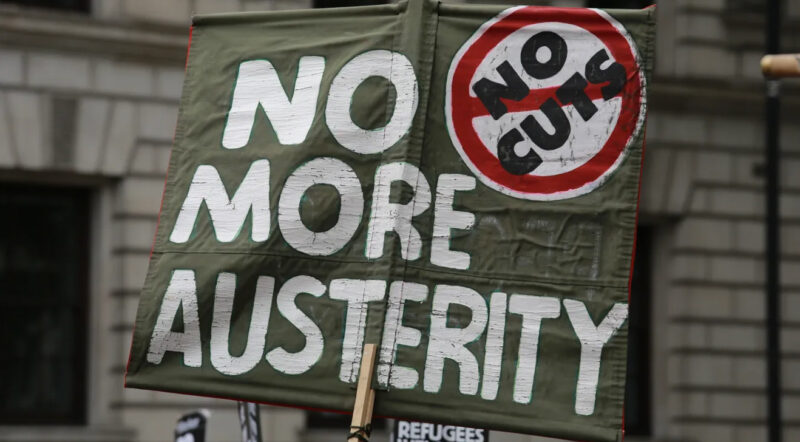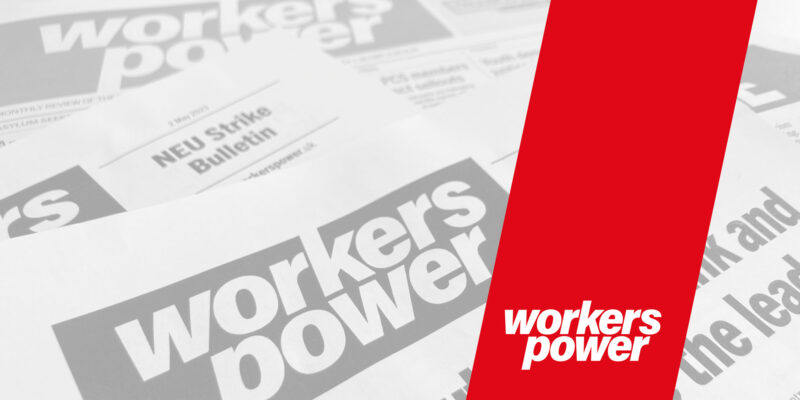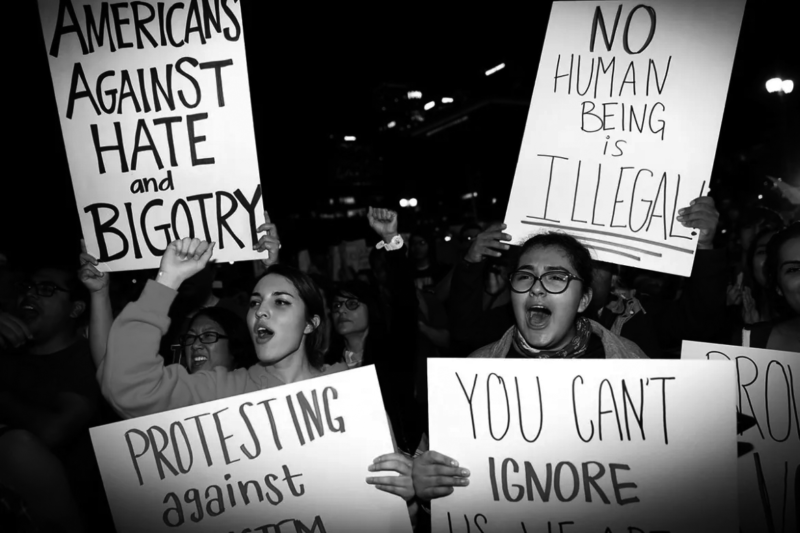The French Parti de Gauche: Old Wine in a New Bottle
By Marc Lasalle
The Parti de gauche (PdG), founded by Jean-Luc Mélenchon in 2008, aims to unite all the forces to the left of the social-democratic Socialist Party. This article looks at the reasons for its rapid growth as well as the current crisis in the Front de gauche (FdG), and considers the claim that it is a model for building “broad parties” in other countries in Europe.
The fifteen years from 1995 to 2010 saw France in the forefront of the European class struggle. Conservative governments, headed by Raffarin, de Villepin and Fillon, launched repeated attacks on the working class, on the public services and the pension system. But each time mass resistance, which combined strike action with mass social movements, saw off these attacks.
The high point came in 2005, when a “No of the Left” campaign in the referendum on the draft EU Constitutional Treaty inflicted a severe defeat on the ruling class. This was followed within a year by a gigantic movement of youth and workers that overturned the government’s first employment contract (CPE) law.
These events revealed huge numbers opposed to the Right’s neoliberal “reforms”, numbers that might represent a formidable force not only on the streets but at the ballot box too. Polls showed that the far left, the Trotskyist groups, could attract the votes of more than 10 percent of the electorate. This radicalisation explains the achievements of explicitly revolutionary candidates in the first rounds of presidential elections. At the same time, the Parti Socialiste (PS) suffered serious electoral defeats in the presidential elections of 2002 and 2007.
After the downfall of the USSR and the “actually existing socialism” of the East European states, the PCF underwent a major rethink of its old pro-Moscow Stalinism, what it called mutation. It explicitly dropped “democratic centralism” (in fact bureaucratic centralism) allowing inner party tendencies, alternative lists for central committee elections etc. This was all hailed as a renaissance of the party. And indeed it rapidly seemed to bear fruit. The party’s secretary, Robert Hue, won 8.8 per cent of the vote in the first round of the 1995 presidential election and in the 1997 parliamentary elections, the PCF won 9.9 per cent and 35 seats.
But it won these advances on the basis of an alliance with the PS under Lionel Jospin – the Gauche plurielle/Plural Left. Indeed, the PCF got ministerial posts in the government. But short-term gain led to long-term pain. Implication in Jospin’s turn to neoliberal policies of privatisations and cuts dictated by the Maastricht process of European integration discredited the PCF in the eyes of its working class electorate.
In 2002, Lionel Jospin suffered a catastrophic defeat in the presidential elections, being knocked out in the first round. At the same time, the PCF saw its candidate Robert Hue get an all-time low of 3.37 per cent, or just 967,000 votes. The beneficiaries of this debacle for reformism were the far left groups. In 2002, Trotskyist candidates together got over 10 percent or nearly 3 million votes, humbling the once mighty PCF.
The PS and the PCF proved unable to recover by the next presidential elections in 2007 that saw the right hold on to power under Nicolas Sarkozy. And, once again, the far left in the person of the young postal worker Olivier Besancenot, candidate of the Ligue communiste révolutionnaire (LCR) got nearly 1.5 million votes. The PCF’s Marie-George Buffet did even worse than Robert Hue and scored 707,000 or just under 2 per cent.
It appeared to both the reformist left and the far left itself that a major displacement was underway in terms of who would lead the militant vanguard of the French working class. The LCR in 2008-9 launched the campaign for a New Anticapitalist Party (Nouveau parti anticapitaliste – NPA), which rapidly attracted around 9,000 members. But the near death experience for the PCF (and to some extent the PS) convinced sections of their leaderships of the need to create something new and more attractive to militant workers and anticapitalist youth, who might otherwise consolidate around the NPA.
Since then, getting this “double digit” result has obsessed the leaders of both the radical reformist and the far left. Connected with this is the project of uniting all the parties to the left of the PS. While many activists were strongly in favour of a unity candidate for the presidential elections in 2007, these discussions foundered because the PCF undemocratically tried to fix the selection process so that its own lacklustre leader, Marie-George Buffet, would win. In some sense, the foundation of the PdG and the NPA were differing answers given to the opportunities posed by this political conjuncture.
Left Party formed
Before 2008, Mélenchon was a relatively minor figure on the left wing of the PS. A junior minister under Lionel Jospin, he did not distinguish himself by expressing any radical opinions although, like Jospin, his early political education was amongst the Trotskyist group of Pierre Lambert. Within the PS, faced with leaders like Lionel Jospin, Ségolène Royal and François Hollande, all unwilling to oppose the neoliberal “reforms” being pressed for by the EU, Jean-Luc Mélenchon decided to split with the party and build a left reformist alternative but one with as much of the rhetorical radicalism, and even revolutionary slogans, as he could safely borrow from the NPA. At the same time, he was realistic enough to know that he needed the aid of the bureaucratic apparatus of the PCF in local and national government and the support of the CGT union federation, still dominated by the PCF.
Immediately after the announcement of the PdG split from the PS in November 2008, Mélenchon and the PCF declared that they were forming an alliance for the European elections. It was to be called the “Left Front for another Europe, democratic and social, against the ratification of the Lisbon Treaty and the other European treaties” – the Front de gauche (FdG).
They clarified that the Front was open to all the parties who had engaged in the victorious ‘No’ campaign against the European Constitutional Treaty in 2005. In the following months, the PdG launched a unity offensive towards the NPA, calling it to join this Front and writing an open letter to its members.
This manoeuvre revealed the aim of both the PdG and FdG; to form an electoral bloc able to attract votes from both the far left and the PS. Their target was the substantial number who had voted for Arlette Laguiller of Lutte Ouvrière and Besancenot of the LCR. This move had a remarkable resonance thanks to the deep divisions within the NPA, inherited from its founder, the LCR.
The destructive factional struggle which broke out in the NPA when it turned down the unity proposals of the FdG, and the subsequent growth of the latter, produced a decline in the NPA’s membership and a decline in its electoral fortunes as rapid as its rise, leaving the field wide open for Mélenchon and a PCF undergoing yet another renaissance.
The peak of this success was Mélenchon’s dynamic presidential campaign in 2012. In Vierzon he declared “We’re back – the France of revolution!” and “if Europe is a volcano – then France is the revolutionary crater!” This barnstorming style culminated in his mass rally at the Place Bastille on 18th March calling for a Sixth Republic and a “citizens’ insurrection” to take back the power from the financiers and give it to the people. Once again the revolutionary verbiage was laid on thick:
“In a revolution, there are no nice bits and nasty bits. It is a whole unto itself! Yes, there may be mistakes and failures, but oh, how marvelous, how glorious, how splendid, how extraordinary, how luminous a story for humankind!” This is a timely reminder to the far left that reformists, too, can fire up the revolutionary rhetoric, especially in France, given its bourgeois revolutionary as well as mass communist traditions.
Yet, when it comes to the class struggle, direct action by the youth or strikes by the workers , Mélenchon and the PdG drop their revolutionary rhetoric completely. Indeed, it is clear that their “revolutionism” is the posturing petty bourgeois populist sort, not a working class socialist one.
The PdG has consistently emphasised traditional “political” means – elections, petitions and rallies, rather than direct action and strikes. This was the case in 2008, when Sarkozy introduced a new “reform” of the postal service. A large mobilisation by workers and users posed the problem of how to continue the struggle. Mélenchon suggested a campaign for a referendum as an alternative to any form of direct action. When, in 2009, the NPA proposed a national march of the unemployed, Mélenchon rejected the idea:
“This worries me a little. Politics should not come up like this in the social movement giving instructions. The trade unions have raised the lid on social resignation. Our responsibility is to lift that of political resignation. The link between social movements and politics is not mechanical. We need to offer a political alternative rather than to be in a competition with the unions.”
These arguments are in line with the famous 1906 Charter of Amiens, adopted by the Confédération générale du travail (CGT) which proclaimed the unions’ “complete independence from political parties”. Whilst its syndicalist authors saw this as a means to keep reformist socialism out of the revolutionary trade unions, in fact, this division only results in blocking mass social and union struggles from espousing and attaining political goals.
In the end this condemns the mass strike waves and social movements, which are regular occurrences in France, to either winning temporary concessions or failing completely, like the great anti-pension reform struggle of 2010. When direct action fails because it cannot be transformed into all out political strike action, it ends up reinforcing a vote for reformist parties as the only solution. Thus, the defeat for the unions in 2010 opened the way for a revival of the PS.
Another classic reformist element in Mélenchon and the PdG’s politics is nationalism. This starts with his view of Europe and his criticism of German dominance:
“We need to strike at the heart of the problem, Europe. We need a break on three points. First, the French-German relationship, that is totally out of equilibrium and profits only German capitalism. Then the Euro. We have always defended the idea that the common currency could help a progressive politics, however, today, this is not anymore possible because of the obstinacy of the European leaders. Finally the Mediterranean arc. Is it not the moment to understand that we have another centre of gravity different from Germany, namely Mediterranean?”
Here Mélenchon clarifies his view of the role of France in the world. Europe does not work because it does not profit French capitalism sufficiently. Even his allusion to the Mediterranean suggests that the natural space for France to turn to is North Africa.
Despite ambiguous statements and veiled criticisms, the reality is that the PdG supports French imperialism in Africa. When Sarkozy decided to intervene in Libya, the PdG supported this intervention. When François Hollande intervened in Mali, the FdG’s official spokesperson in the parliament voiced his full support for the intervention. Mélenchon himself, it is true, restricted himself to asking Hollande to reveal the real reasons for this intervention. But neither PG nor FdG organised any sort of demonstration against this intervention.
More recently, in December 2013, when France sent troops to the Central African Republic, François Delapierre, national secretary of PdG, expressed their position pretty bluntly:
“In contrast to previous military operations, this is totally within international law because the UN Security Council has given to our country a mandate to support the African force MISCA, whose objective is to protect the civilian population and to “stabilise” the country.”
He went straight on to say:
“Energy production in our country depends on this resource (uranium) that is not produced in our subsoil. Central Africa has the Bakuma deposits and strategic borders with neighbours who have the precious mineral. So long as nuclear energy remains the primary source for electricity production in our country, France will control the governments which keep the keys to the African mines”.
Refreshingly frank imperialist reasoning, but not a socialist, let alone a revolutionary, position.
While the NPA consistently opposes French imperialist interventions in the African countries, the PdG does not. Indeed, it is plainly on the other side of the barricades on this crucial issue. Those who think that the distinction between reform and revolution is an “old twentieth century dogma” and of no use in practical politics, should consider this. It is especially worth thinking about as we approach the centenary of August 4th, 1914, when the socialist parties of the Second International decisively demonstrated their imperialist patriotism and became, in the words of Rosa Luxemburg, “stinking corpses” when it came to defending the interests of the working class.
The New Anticapitalist Party and the Front de Gauche
When the PdG addressed the NPA for an electoral pact, the NPA simply chose to ignore it, a serious mistake. Today, the FdG has humiliated it in the 2012 presidential elections. In the first round, the NPA’s candidate, car worker Philippe Poutou, received 411,160 (1.5 per cent) whereas Mélenchon and the FdG received 3,984,822 votes (11.10 per cent). The NPA has been replaced as the major force to the left of PS. Nevertheless, the NPA has still not produced a serious or thorough critique of its performance.
The reason for this silence is that the Front’s style of reformism is far from being completely alien to the sort of politics many NPA members want to advance in public. The best proof is the fact that three splits from NPA to FdG have taken place within four years. First, there was Christian Piquet and Gauche Unitaire in 2009, then Tendencies C & A in 2010, finally the Gauche Anticapitaliste in 2012.
The line of all these tendencies inside the old Ligue Communiste Révolutionnaire (LCR) and the NPA was the following: the class struggle is declining and in a defensive phase. Revolutionary perspectives are off the agenda for the foreseeable future. We need to regroup with the forces to the left of PS. This will give us more strength both for the struggles and, above all, for winning seats in elections. This opportunist right wing from the LCR wanted not a new anticapitalist party with its talk, however vague, of revolution, but rather organic unity with the PCF and the left wing of the PS on an anti-neoliberal basis.
The foundation of the NPA was a catastrophe for them, an ultra-left adventure, and they set out to sabotage it in every way they could. In this, they were aided by the system of permanent tendencies (in fact, factions) and their “right” to agitate against the LCR’s and then NPA’s democratically arrived at policy decisions, including during election campaigns. Incidentally, it is a worked proof that if “pluralism” means freedom to break the party’s unity in action and to argue in public against its line, then it is the shortest road to self-destruction for a party. Quite simply, Leninist democratic centralism and Bolshevik discipline are not only better, they are indispensable.
For the deserters, however, it seem that the FdG is not such an optimal place to put their ”unite the left” policy into practice. The FdG remains essentially an electoral front, with all the different parties participating as separate entities. Therefore, the small groupings coming from NPA found themselves in a kind of ghetto. The antagonisms between them seem as sharp as ever and some have been making overtures to the NPA for joint work. The whole episode should be familiar to those in Britain who have witnessed the debacle of Respect and the Scottish Socialist party. “Broad “parties (combining revolutionaries and reformists on the latter’s terms) and pluralism are, it seems, no alternative to the sectarianism of a Socialist Workers Party or, for that matter, Lutte Ouvriere.
But, as well as these disloyal currents, the temptation to block with FdG and to mimic left reformism, runs much deeper inside NPA. The kind of left reformism proposed by PdG is exactly what LCR-NPA leaders chose to accept at the moment of founding the party. Of course, this could have been accepted as a temporary platform in the framework of creating a mass workers’ party, dominated by new layers of workers, youth and activists who still had to shed illusions in reformism or simply did not have developed revolutionary politics.
But this would have required the revolutionaries to make clear that they did not regard demands that limited themselves to the framework of capitalism were sufficient and that militant direct action for these limited demands was the essential basis for going forward. A revolutionary minority would have immediately begun a discussion with the reformist majority aimed at winning the latter to a revolutionary transitional programme.
Nothing like this was done when the NPA rapidly reached 10,000 members. An initial promising discussion on programme was soon abandoned. In the great strikes and social movement of 2011, the NPA, though active and in the forefront of struggles, did not warn of the union leaders’ likely retreat and did not criticise it strongly when it took place. Instead, it turned to electioneering on a weak, non-revolutionary programme, not very different from Mélenchon’s. In the end, this all meant obscuring the NPA’s distinct political message, to the point that rank and file workers could not make out the difference between NPA and FdG. In the end, they turned away from NPA, considering its refusal to block with Mélenchon just sectarian.
Despite these disasters and the collapse of membership back to the 3000 the LCR claimed before founding the NPA, its leadership seems totally incapable of formulating any clear tactic towards PdG or a clear critique of its reformist line. Their new perspective of seeking an alliance with the PdG is likely to prove a self-delusion organisationally as well as politically. Why would the PdG need the NPA now? However, to recognise this would mean recognising the need to formulate a clear and coherent revolutionary programme. The NPA leadership seems neither willing nor able to address itself to this task.
In Conclusion
The PdG profited from a rapid upward trajectory, developing in a year or two from a small split into a national party. Its electoral front with the PCF, the FdG, has obtained not insignificant scores (around 6 per cent) in the 2009 and 2010 European and regional elections. Mélenchon even attained the yearned-for double-digit score (11 per cent) in the first round of the 2012 presidential elections. However, the reasons behind these successes could yet prove to be the seeds of its next crisis.
The PdG is still quite small and weakly rooted when measured against the PCF. It has only around 12,000 members. Its elected representatives are few, one member of the European Parliament, 17 regional councillors, 11 general councillors, one metropolitan councillor, two Paris councillors. It heads only seven communes of more than 3,500 inhabitants and has no deputies in the lower house of parliament or the Senate. Moreover, the PdG could only achieve what gains it has thanks to the still dense network of the PCF in French society, and especially thanks to the CGT union campaigning for the FdG on several occasions.
Contrast this with the PCF. It has 138,000 members, though only 70,000 of these pay their subs. It has 13 MPs and 19 senators, 10,000 councillors in 800 councils, 89 mayors of towns with more than 9,000 inhabitants. Given that many of these receive handsome salaries, it is clear why defending these gains, made with PS support at a local level, is non-negotiable for the PCF, as is its refusal to rule out taking office again as a junior partner in a PS-led government.
The PdG on the other hand can only grow at the expense of the PS and by challenging it electorally wherever possible. The PS, for its part, does not need deals with such an electorally negligible a force as the PdG.
After the election of François Hollande, the PCF and PdG were immediately faced with a serious political difference. The PCF, true to its tradition since the 1980s, has chosen not to oppose the government but simply to criticise it. It believes it will in this way obtain some progressive measures. In reality, the PS controls the PCF’s financial lifeline, since only with its support does it hang on to its MPs, councilors, mayors and many other elected and salaried positions.
The PCF’s determination to strike electoral agreements with the PS for the March 2014 local elections, especially in Paris, has outraged Mélenchon and the PdG. In October last year, the PCF’s unilateral decision to do this provoked Mélenchon to delay FdG agreement for the European elections in May. Since the PCF’s summer school, a veritable vendetta has also been going on between Mélenchon and Pierre Laurent, leader of the PCF. Mélenchon was even more furious when Laurent was elected as president of the European Left Party, the bloc of parties to left of the Social Democratic and labour parties in the European Parliament, and threatened to withdraw temporarily from the organisation.
This squabbling over the spoils of electoral office indicates again exactly what sort of party the PdG is. It is not really a “new party” whose “broadness” should serve as a model for Left Unity in Britain, or anywhere else for that matter. It is a traditional reformist party, like those we have seen betray the working class whether in power or opposition for the last hundred years.
For all its denunciation of financial capitalism, the Parti de Gauche is not an anticapitalist party at all. It is a party that, for all its talk of a “citizens’ revolution” and a Sixth Republic, still supports the repressive machinery of the existing capitalist state. It is also a party that, for all its pledges of internationalism, defends French imperialism and its control of countries of the former French Empire in Africa when the chips are down. It is the kind of party that neither the French nor the British working class needs.
Appendix
The 2012 Parti de Gauche Programme
Jean-Luc Mélenchon and the FdG’s programme for the 2012 presidential election gives a comprehensive overview of his and his party’s cross-class, populist politics. The title itself is significant: “The Human first” (L’humain d’abord). This is a programme that contrasts “the people” to high finance, in the tradition of the Popular Front of the 1930s.
The programme starts with the kind of rhetoric that marks all Mélenchon speeches: “Yes, it is possible. Humanity has already overcome several catastrophes. Behind the crisis of the capitalist system developing under our eyes, there is the possibility of a better world.[…] All these evils have their common origin in the essential feature of our epoch: the domination of financial capital on the world.[…] To solve the crisis, it is necessary to take back the power.”
But who is going to do that and what means will be necessary to do that?
“To solve the crisis it is necessary to elect leaders not depending in any way on the financial oligarchy and over whom the people (le peuple), thanks to a VI Republic, exert real power. A citizen revolution is necessary. In France, let the people take its place”.
This makes it quite clear that Mélenchon and the PdG-PCF alliance represent the latest embodiment of a long tradition in French politics. Its roots lie in the great French revolution and it has found its way through over two centuries and five different republics. Violently opposed to monarchic rule, the Church and then the oligarchic system, it represented the interests of the petty bourgeoisie in its struggle to build a modern bourgeois state. This struggle was no peaceful development and, indeed, the republican section of the bourgeoisie was repeatedly obliged to call “the people” to arms, even sounding the trumpet of revolution, as shown by the upheavals and revolutions of the nineteenth century. It is from this tradition that Mélenchon draws “radical” rhetoric, calling for a “citizen revolution” or “a revolution through the ballot box”.
The revolution that Mélenchon prates about is clearly a bourgeois one and a peaceful, constitutional one to boot. There are no Marxist terms or analysis, no reference is made to the working class throughout the entire document; indeed, the adjective “ouvrier” appears only twice in 40 pages. The active subject to whom this programme is addressed is variously referred to as “the people” (peuple), humans, citizens, everybody (chacun et chacune). When the term class is used, it is the “popular classes” (classes populaires).
The political strategy behind this is an attempt to overcome the crisis of traditional socialist and Communist reformism (PS and PCF) by reaching back to a pre-Marxist brand of populism, where the working class is fused with an undefined people, composed of all kinds of social layers, the petty bourgeoisie, peasants, middle class etc.
The demands listed in the programme sound radical at a first reading: “Reestablishment of the 35 hour working week. Pensions at 60. A minimum wage of €1,700 ”. However, closer inspection reveals that most of these demands, simply revert to the situation 20 years ago, before the austerity programmes of Mitterrand, and later Chirac and Sarkozy began. For instance, where the NPA at least calls for a publicly owned banking monopoly, the PdG simply proposes a public banking pole, alongside, rather than replacing, the private sector. Measures to solve the economic crisis are simply the old Keynesian ones from the past. Mélenchon does not threaten to expropriate even the financiers he attacks so demagogically.
When the PdG explains the means by which this “citizen revolution” will be carried through, the balloon of rhetoric is pricked. They call for a new Sixth Republic, where a new political leadership and rejuvenated bourgeois institutions will put the programme into practice. In effect, this is a restoration of the Third (1877 -1940) and the Fourth (1947-58) Republican constitutions, which were parliamentary rather than the Gaullist constitution in force today. The programme makes this clear:
“Against presidentialism, we will defend the parliamentary system and restore balance between the powers. We want to restore the primacy of the National Assembly over the executive. The excessive powers of the President of the Republic must be removed as part of a general redefinition and reduction of its functions. The Government must be responsible to the National Assembly. We propose the abolition of the Senate or its profound reform to become a chamber for relaying the views of local communities and citizens’ initiatives. Proportional representation must be restored for all elections”.
Though Marxists are always opposed to bonapartist strong executives such as De Gaulle introduced with his Fifth Republic, which Socialist Presidents and prime ministers have done little to modify, let alone abolish, once again this is still only a restoration of the old bourgeois republics, however preferable this might be in formal terms. It does not represent the kind of state power that would enable the working class to enact the measures needed to solve the present crisis at the bosses’ expense, let alone to introduce socialism. Only a workers’ government, resting on the working class organised in councils, could address the former and, by taking full power, move on to the second. This, a socialist revolution, is the only kind of revolution possible in France.
The reality is that this programme does not challenge capitalism or its state in any way, calling at most for new forms of property, like cooperatives, and does not challenge the bourgeois state, which, if anything, would actually be reinforced (the programme demands a halt in the decline in the police workforce and the restoration of the role of “neighborhood police” (police de proximité).
On international policy, the programme makes many attacks on the European Union. “We demand a Europe freed from the Lisbon treaty”. This is quite rich since Mélenchon and the PCF were both part of the Jospin government which signed the Lisbon Treaty. It proclaims, “We need a secular Europe, independent, with peace and international solidarity” but this does not mean an end to French imperialism and its oversees interventions, as we saw above.
To sound up to date, the programme calls for “ecological planning” to avert the environmental catastrophe. Here, no clear set of demands emerges. An example is given by the energy policy, where a “citizen debate” is called for to take major decisions. This reflects the fact that PdG and PCF have a major difference with respect to nuclear energy. The first being against while the second is in favour of it.
The programme ends as it started, with hollow rhetoric: “The crazy world under our eyes is the result of the increased domination over the world by financial capital, the monstrous product of two decades of neo-liberal politics that has sown the seed of a serious regression of civilisation. To shake the tyranny of the markets, it is enough that the people starts moving.”
Reading all this, the real question arises: how could this mélange of old style reformism and populism, barely hiding the past betrayals of the working class by PS and PCF be so successful in terms of aura and of political influence and electoral support? Why was the NPA unable to tackle its weak politics or to unmask its false pretense of representing something new?










